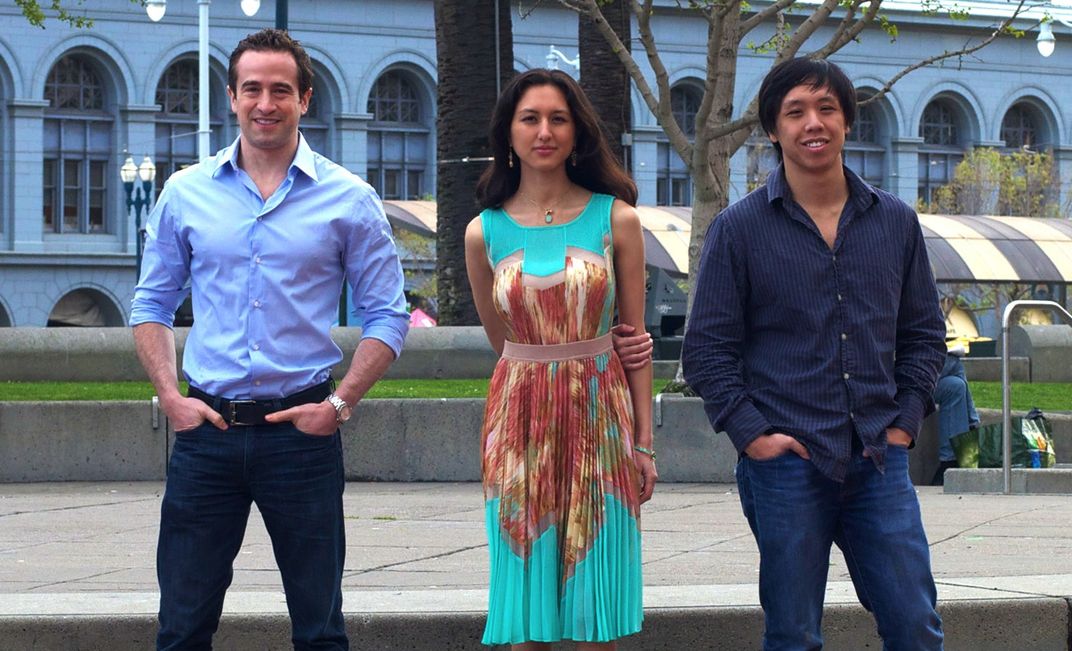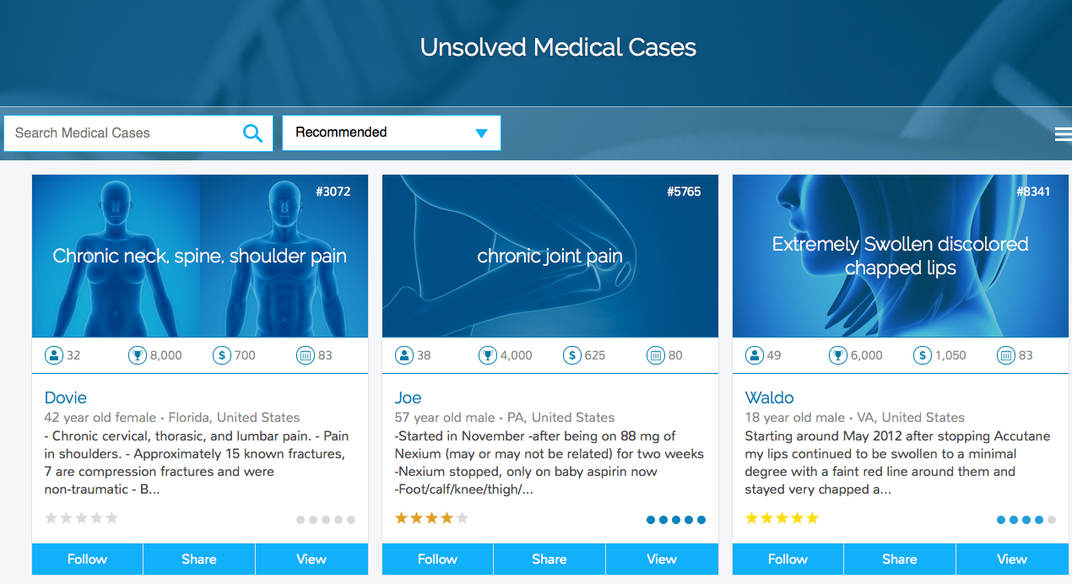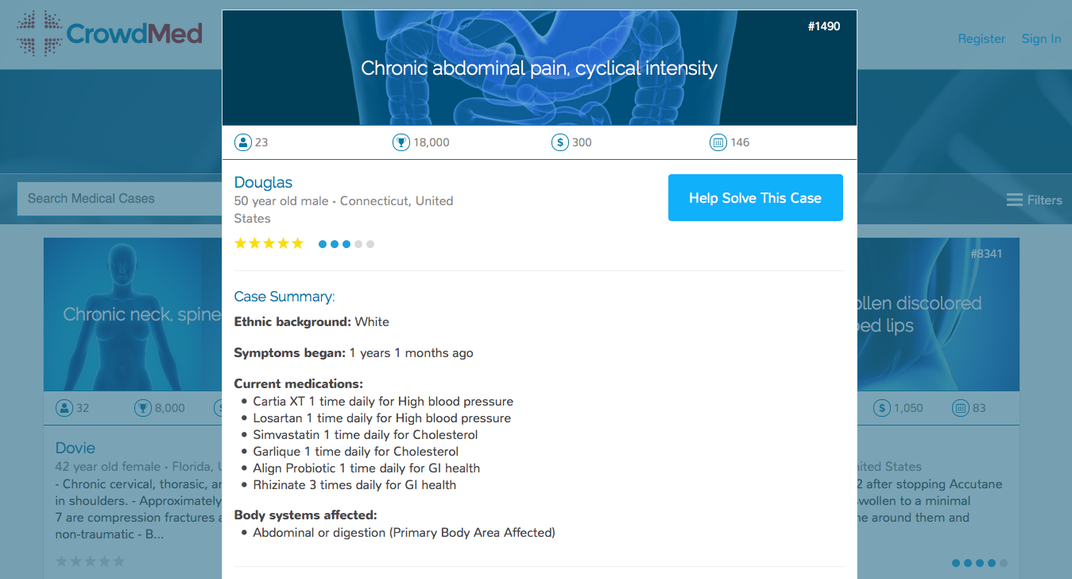Can You Crack a Medical Mystery?
A startup called CrowdMed asks volunteer detectives to study cases of patients with symptoms that baffle doctors
/https://tf-cmsv2-smithsonianmag-media.s3.amazonaws.com/filer/f4/f5/f4f5b93a-8fa6-4d42-af46-1193ad57e437/42-71102364.jpg)
Jared Heyman's younger sister Carly started to experience, without apparent cause, a rash of strange symptoms in 2003. The 18-year-old fell into a deep depression, slept 14 hours a day, gained 50 pounds, woke up several times a night in a cold sweat with nightmares and had suicidal thoughts.
"Over the next several years, our parents brought Carly to 16 different medical specialists and racked up over $100,000 in medical bills, desperately seeking a diagnosis. Each doctor would treat her symptoms as best they could, but none could identify the root cause of her illness," says Heyman. It was a medical mystery.
It wasn't until Carly saw an interdisciplinary team of physicians at the NIH Undiagnosed Disease Program in Bethesda, Maryland, that she finally received a diagnosis. She had fragile X-associated primary ovarian insufficiency, a rare disease that affects just 1 in 15,000 females. And come to find out, a hormone patch relieved all of her debilitating symptoms.
To prevent others from having to go through a similar experience, Heyman, a tech veteran who at 20 years old founded the market research company InfoSurv in 1998, thought he would leverage the internet and its users to tackle confounding medical questions like the one his family encountered. Working with developer Axel Setyanto and designer Jessica Greenwalt, he co-founded CrowdMed, a website that enables users to post their medical mystery cases for $50 and crowdsource a potential diagnosis or recommendation from detectives who sign up to be part of the site's effort. Detectives include actual physicians as well as contributors with little medical background who are just interested in helping. Heyman shares his story with Smithsonian.com.

Let's start with the problem. What problem are you trying to fix?
The problem with our medical culture today is what I call the 'Dr. House Paradigm'—this notion that any medical mystery can be solved by a lone genius, working in isolation, if only we can find him. It’s a paternalist paradigm that gives us great comfort emotionally, but it’s simply untrue. The truth is that no doctor, no matter how brilliant, can keep up with the vast amount of medical knowledge that exists today. Unfortunately, Dr. House is a fictional character.
However, there’s a phenomenon called 'the wisdom of crowds,' which shows that large and intellectually-diverse crowds tend to be much smarter than even the smartest individual experts in the world, as long as the right mechanism is in place to aggregate their collective intelligence. We developed CrowdMed to be the optimal mechanism for crowdsourcing medical answers.
So, what exactly is CrowdMed? Can you give me your elevator pitch?
CrowdMed is harnessing 'the wisdom of crowds' to help solve the world's most difficult medical cases online, many times less expensively and more quickly than the traditional medical system. A patient with an unsolved medical mystery posts his or her case by answering a comprehensive set of medical questions and uploading relevant images and diagnostic test results. Then, select members of CrowdMed’s community of over 15,000 registered medical detectives collaborate on solving it using chat, discussion and suggestion features, while a patented prediction market technology accurately identifies the most probable diagnoses and solutions.
Using this innovative crowdsourcing methodology, CrowdMed has resolved over 1,000 real-world medical cases to date, with a 70 percent success rate, for patients who on average had been sick for 8 years, seen 8 doctors and incurred over $60,000 in medical expenses before submitting a case. The average case resolution time is 2 months and the cost is less $500.
With an early prototype, we tried to retroactively crowdsource the answer to my sister’s case using 100 randomly selected people and showing them the exact same information that her doctors had before she was diagnosed. Much to even our own surprise, our crowd correctly identified her diagnosis in just a few days and at negligible cost. That’s when I devoted myself full-time to founding the company.

How does it work, exactly?
We don't select the medical mysteries that go on our site—anyone may submit a case. You start by signing up as a medical detective. Then, you can search or browse through hundreds of active cases. With patients and other detectives, you discuss symptoms, medical histories and other clues that could help crack a case. You build up your CrowdMed reputation by making smart suggestions, and supporting those of your peers. As your ranking and influence increases, you earn the right to participate in more advanced cases.
Medical detectives starts off with 20,000 points that they can allocate to medical solutions and diagnoses that they have confidence in. They can earn points and even thousands of dollars in cash rewards, while improving their medical knowledge, if they help patients identify potential diagnoses that are supported by the CrowdMed community and an algorithm that examines the probability of each recommendation. When posting cases, patients are able to pay an extra fee that serves as monetary compensation to recruit the highest ranked medical detectives to their case.
How do you verify both the cases and the people contributing ideas?
We utilize a performance-based reputation system to vet medical detectives, which we call our DetectiveRating (DR) system. This system provides new users with relatively little influence until they prove their case-solving skills, as measured by their correct diagnostic and solution suggestions, points won and peer ratings. This is in contrast to the credential-based traditional medical system, where people get greater influence based upon their formal background rather than actual performance. Interestingly, we've seen that many of our site's top-performers don't necessarily have the highest formal medical credentials. Our patients understand that your suggestions do no constitute medical advice and only their doctor can provide a definitive diagnosis and treatment plan.

As you see it, what is the potential impact CrowdMed could have on addressing rare illnesses?
There are over 7,000 rare diseases, and it's impossible for any one expert to be familiar with all of them. However, the collective intelligence of a crowd is virtually unlimited. This is why CrowdMed has a 70 percent success rate solving challenging cases that the medical system could not, and 95 percent of our final diagnoses have come up only once or twice ever on the site, which illustrates how rare and obscure these diagnoses are.
We've collected many hundreds of notes of thanks from patients, many saying that we either saved their life or dramatically improved their quality of life after many years of suffering. We find these human stories just as compelling as our success metrics.
How do you plan to scale your company? What's next?
The next step for us is partnering with health insurance companies and medical providers to bring CrowdMed to their millions of patients. We can save our partners incredible sums of money by crowdsourcing the diagnoses and solutions to their most difficult and expensive patient cases, while dramatically improving patient outcomes.
/https://tf-cmsv2-smithsonianmag-media.s3.amazonaws.com/accounts/headshot/profile.jpg)
/https://tf-cmsv2-smithsonianmag-media.s3.amazonaws.com/accounts/headshot/profile.jpg)